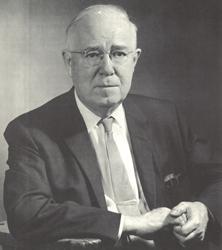By Daniel Hathaway
. Charnofsky’s latest discoveries, and the challenges of producing Don Giovanni
. Almanac: remembering Leo Sowerby (pictured)
HAPPENING TODAY:
As he does every Monday from 2-4 pm, Eric Charnofsky goes searching for unusual and underperformed works for his program Not Your Grandmother’s Classical Music. Featured today: Anton Arensky’s Suite No. 3 “Variations” for Two Pianos, Yelena Firsova’s Misterioso (in memoriam Stravinsky) for string quartet, Charles Ives’ selected songs for baritone and piano, John Heiss’s Whimsies (flute and piano), Nino Rota’s Cello Concerto No. 2 & Dietrich Buxtehude’s Sonata in G for violins, gamba, and basso continuo. Click here to listen to the internet feed: or tune in to 91.1 FM in the greater Cleveland area.
INTERESTING READ:
Writing in the April 30 print edition of The New York Times, Joshua Barone notes that
There are operas that are challenging for their sheer technical demands — the density of Berg’s “Lulu” or the heroic immensity of Wagner epics. And then there are those that seem simple but are actually some of the most difficult.
In that second category fall Mozart’s three collaborations with the librettist Lorenzo Da Ponte — “Le Nozze di Figaro,” “Don Giovanni” and “Così Fan Tutte” — works of slippery psychology, frank humanity and, crucially, crystalline construction that punishes any mistake onstage or in the orchestra pit.
Particularly tough to stage is “Don Giovanni,” which returns to the Metropolitan Opera in a new production on May 5, with Peter Mattei in the title role. Click here to read The Pains and Privileges of Staging Mozart’s ‘Don Giovanni.’
ALMANAC FOR MAY 1:
by Daniel Hathaway
Leo Sowerby, born on May 1, 1895 in Grand Rapids, Michigan, figured prominently in the musical life of Chicago, where his works appeared regularly on Chicago Symphony programs, but is remembered today mostly for the music he wrote for St. James’ Church (later Cathedral) where he served as organist and choirmaster from 1927. In 1962, he retired and became founding director of the College of Church Musicians at Washington Cathedral, a position he held until 1968, when he died at Port Clinton, Ohio, enroute to Camp Wa-Li-Ro in Put-in-Bay, the summer choir camp where he had taught for many years.
(In summers, Sowerby also taught at the Evergreen Conference for Church Musicians in Colorado, where I had the honor of participating in his composition class while in high school. He recommended my Four Evening Orisons to his publisher, H.W. Gray, and they may still be in print.)
Sowerby won the 1946 Pulitzer Prize in Music for The Canticle of the Sun for chorus and orchestra, premiered by the New York Philharmonic and the Schola Cantorum in 1945 at Carnegie Hall (and performed here by Caros Kalmar and the Grant Park Orchestra and Chorus of Chicago in 2011).
Among the composer’s virtuosic works for the organ are Pageant (played here by Alan Morrison), and his Symphony for Organ (whose final movement, Passacaglia, is performed here by Tate Addis at Yale’s Woolsey Hall in 2015). Sowerby also wrote an engaging Classic Concerto for organ and strings, performed here by Rolf Karlsen and the Oslo Philharmonic under William Strickland.
Then there’s Sowerby’s famous Pageant, a pedal extravaganza that he composed for the young Italian virtuoso, Fernando Germani, the organist at Saint Peter’s Basilica in Rome. Germani commented after seeing the score; “Now write me something really difficult”. Listen here to a performance by Ken Cowan on the organ at Saint Paul’s Episcopal Cathedral in San Diego, built by Quimby Pipe Organs of Warrenburg, Missouri. Cowan recently played a recital in Youngstown’s Stambaugh Auditorium.




